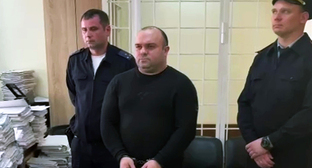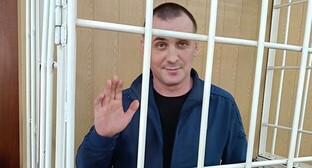11 July 2022, 14:53
Week in the Caucasus: review of main events of July 4-10, 2022
Eid al-Adha celebration in Southern Russia; persecution of pacifists in the southern regions of Russia; decision of the ECtHR in a case on torture of a resident of Sochi; strike of workers at a metallurgical plant in Georgia; acquittal in a case against Dagestani official, – see the review of these and other events in the Caucasus during the week of July 4-10, 2022, prepared by the “Caucasian Knot”.
Eid al-Adha celebration in Southern Russia
On July 9, festive prayers on the occasion of the holiday of Eid al-Adha were held in the mosques of the southern regions of Russia. The opportunity to celebrate Eid al-Adha without coronavirus restrictions delighted Muslims of Volgograd. At least 3000 believers came to the festive prayer in the city mosque, said the Mufti of the Volgograd Region. About 2000 people came to the festive prayer on the occasion of Eid al-Adha at the Cathedral Mosque in Pyatigorsk. After the removal of COVID restrictions, the mosque was full with the people who came to celebrate the holiday, reported the Deputy Mufti of the Stavropol Territory. In Nalchik, the Cathedral Mosque could not accommodate all the participants in the Eid al-Adha namaz (prayer), and many believers prayed on rugs outside the mosque. According to believers from various regions of Northern Caucasus, the removal of COVID restrictions also intensified the activities of philanthropists. Residents of Chechnya noted an increase in prices for sacrificial animals. Residents of Makhachkala also reported that prices for sacrificial animals had increased significantly on the eve of the holiday.
Persecution of pacifists in southern regions of Russia
In Southern Russia, the persecution of residents who oppose the special military operation in Ukraine and related events continues. So, on July 5, in Volgograd, a court imposed a fine of 15,000 roubles on local resident Maxim Plaksin, finding him guilty of discrediting the Russian Armed Forces after writing a post on a social media outlet. On July 6, it became known that Irina Slavkina from Prokhladny, a mother of three children, was suspected of discrediting the Russian Armed Forces. The reason for suspicion was a comment left on a social media outlet under a post about blogger Insa Lander. On July 7, human rights defenders reported that the Yeisk District Court of the Krasnodar Territory fined Igor Deinega 35,000 roubles. According to the ruling released on the website of the court, the accused was the administrator of a WhatsApp* group where posts discrediting Russian militaries were published. On the same day, it became known that Aleksei Nechislyaev, a resident of the Starominsky District of Kuban, was fined 30,000 roubles under the article on discrediting the Russian Armed Forces for a solo picket held near the Lenin monument on March 18. Yuri Osokin, a resident of the Kievskoye village in the Krasnodar Territory, was sentenced by a court to 15 days of administrative arrest. The court recognized as hooliganism the inscriptions with calls for peace left in a smoking room and a “pacific” sign on his helmet. On July 9, it became known that a court in the Abinsk District of the Krasnodar Territory fined local resident Emir Nizambaev 30,000 roubles under the article about discrediting the Russian Armed Forces for pacifist posts on a social media outlet.
Decision of ECtHR in case on torture of resident of Sochi
On July 5, the Strasbourg Court obliged the Russian authorities to pay Sochi resident Mardiros Demerchyan 52,000 euros in compensation for moral damages for torture, as well as 3,600 euros in compensation for legal costs and expenses. Let us remind you that Mardiros Demerchyan, who worked at Olympic facilities, complained that after being detained on June 12, 2013, he was subjected to severe torture on suspicion of stealing building materials. Investigators refused to institute a case on torture. Moreover, Mardiros Demerchyan himself was charged with a false denunciation. A court found him guilty, but the verdict was cancelled, and the case was sent for reconsideration. In May 2018, a court in Adler closed the case on cable theft and false denunciation of policemen, but did not rehabilitate Mardiros Demerchyan. The man cannot count on the payment awarded by the European Court of Human Rights (ECtHR), since Russia does not comply with the decisions of the European Court issued after March 15.
Strike of workers at metallurgical plant in Georgia
On July 4, about 130 workers at the Rustavi metallurgical plant went on strike. They demanded a 30 percent increase in wages, the payment of the 13th wages, and better working conditions. Before the strike, the wage at the metallurgical plant averaged 1000 laris (about 340 US dollars). On July 7, the workers rejected the metallurgical plant administration’s proposal for a step-by-step indexation of wages by 15 percent (by about 150 laris, or about 51 US dollars). The protestors said they would continue to strike until wages were increased by a third. On July 8, the strikers accepted the proposals of the metallurgical plant administration, and the work of the enterprise was resumed. According to the agreements, the wages of the plant’s workers will be gradually increased by the equivalent of 85 US dollars, and the amount of wages will be increased starting from July, a trade union representative reports. Furthermore, the metallurgical plant will restore the bonus system that existed and was cancelled earlier, and it is also planned to conclude a collective labour agreement.
Acquittal in case against Dagestani official
On July 4, the Soviet District Court of Makhachkala acquitted Magomed Suleimanov, who was accused of abuse of office as Acting Mayor of Makhachkala and of using official authority as director of the Territorial Compulsory Medical Insurance Fund of Dagestan. Magomed Magomedov, the deputy editor-in-chief of the weekly newspaper “Chernovik” (Rough Draft), called the decision of the court in the Magomed Suleimanov’s case an event that would cause public outcry. Magomed Magomedov points out that courts not often pronounce verdicts of acquittal in cases against officials. According to Gadjimurad Sagitov, the editor-in-chief of the Dagestani newspaper “Novoye Delo” (New Clause), who do not agree with Magomed Magomedov, it is an arrest which causes public outcry, and relatives of officials worry about their further fate more than the public. There is no undue attention to the court’s decision, notes Milrad Fatullaev, the editor-in-chief of the RIA “Derbent”, who ruled out the possibility of the Magomed Suleimanov’s return to the political field of Dagestan. It should be noted that Magomed Suleimanov was initially detained and arrested in the case on creation of a criminal community.
*On March 21, the Tverskoi Court of Moscow banned the activities in Russia of the Meta Company, owning Facebook, Instagram, and WhatsApp, in connection with extremist activities.
This article was originally published on the Russian page of 24/7 Internet agency ‘Caucasian Knot’ on July 11, 2022 at 09:30 am MSK. To access the full text of the article, click here.





Комментирование через Кавказский узел